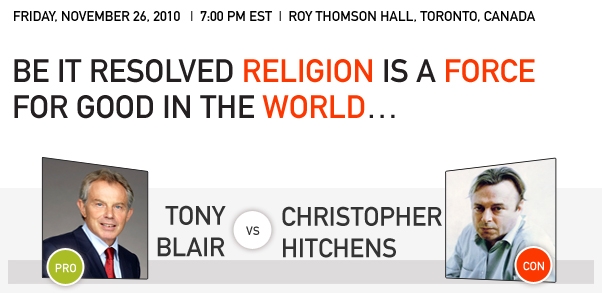Yes indeed, the big day is fast approaching … Blair really has agreed to debate Hitchens in Toronto on 26 November (the event will be streamed live online, link for that live streaming is below at the end) on the motion: “Is religion a force for peace or conflict in the modern world?”.
It should be truly fascinating to watch. Tony Blair, when UK prime Minister was asked by an American journalist from Vanity Fair a question about belief, his former communications manager Alistair Campbell stopped the interview in its tracks: “We don’t do God,” he barked from the sidelines. And they didn’t, but then unlike the US, the UK is a far more secular culture, so religion does not win votes, thus it was a smart move. However, the moment he left office he immediately declares his conversion to Catholicism, but then waiting until after he left office was probably a wise move, especially when you consider that one of the duties of the UK Prime Minister is the appointment of Church of England bishops.
OK, so what do we know about the debate that is to take place in 5 days?
“This debate is not about the existence of God,” says Rudyard Griffiths, co-director and moderator of the Munk Debates.
“We have asked Mr. Blair and Mr. Hitchens to wrestle with the more immediate question facing developed and developing nations: Is religion a force for peace or conflict in the modern world?” he explained.
The official resolution, “Be it resolved, religion is a force of good for the world,” is close to the hearts of both debaters.
Arguing for the resolution, Mr. Blair said: “Understanding religion and people of faith is an essential part of understanding our increasingly globalized world.”
“The good that people of faith all over the world do every day, motivated by their religion, cannot be underestimated and should never be ignored. But there are a lot of misconceptions out there about religion.
“Challenging the myths that are born out of the actions and words of a controversial few is incredibly important,” added Mr. Blair, who has served as the Quartet’s special envoy to the Middle East, and recently released his bestselling memoir, A Journey: My Political Life.
Religion has figured more prominently in the former prime minister’s life since he left office. Two years ago, he launched the Tony Blair Faith Foundation, which promotes “respect and understanding” among the world’s three major religions.
Mr. Hitchens, in contrast, has renewed his beliefs in atheism since being diagnosed with esophageal cancer earlier this year. His most recent bestselling books, God Is Not Great: How Religion Poisons Everything, and Hitch-22: A Memoir, argue religion is a false promise that fosters apathy.
Speaking from his home in Washington where he is undergoing chemotherapy, he said religious people tend to claim moral authority on ethical issues which is often false.
While he respects many of the political decisions Mr. Blair made while he was in office, including international interventions in the Balkans, Sierra Leone and Iraq, he says he’s confounded by Mr. Blair’s recent public embrace of religiosity.
“He couldn’t do it while he was prime minister, but he went ‘over to Rome’ as soon as he could. Very bizarrely he did this at one of the most conservative times for the Catholic Church, under one of the most conservative Popes,” he said.
“I’ve never had the chance to sit down on talk it through with him … It’s not like I’m going to be arguing with [U.S. televangelist] Pat Robertson. Mr. Blair’s a much more complex person than that,” he added.
Mr. Blair, for his part, said he was “delighted that I’ll be putting my argument across in the Munk Debates … discussing a subject that is of utmost importance to world affairs.
“Christopher, for whom I have great respect, promises to be a formidable opponent,” he said.
While previous debaters have included heavy hitters such as special envoy Richard Holbrooke and HIV/AIDS UN special envoy Stephen Lewis, this fall’s debaters are generating international buzz.
“There is interest from all over the world,” said Peter Munk, who created the debates through the Aurea Foundation, a Canadian charity he established with his wife, Melanie, in 2006.
“This is going to be a heated, stimulating and informative debate on a subject as current as it gets,” he said.
The Munk Debates are open to the public. The debate will take place on Friday, Nov. 26, at Roy Thomson Hall in Toronto at 7 p.m. with a free public reception to follow. Tickets go on sale 11 a.m. on Oct. 14.
Live streaming will be available at www.munkdebates.com

Excellent beat ! I would like to apprentice at the same time as you amend your web site, how could i subscribe for a blog website? The account aided me a applicable deal. I had been a little bit familiar of this your broadcast provided vivid transparent concept
The existance of God is not at stake. This debate will resolve nothing. God is not Religion and Religion is not God. The Human mind is not capable of fully comprehending what God is. All we need to focus on is making sure our hearts are connected to our heads then the world would be a far better place. This is true for both Theists and Atheists alike. That’s all we need to understand about God. The rest will fall into place.
Actually … what we really need to understand about God is that he does not exist, its a man made concept … there is not one single bit of evidence, not a jot … as for making a better world, if we learned to put aside dogma, (be that belief-driven dogma, or political-driven dogma), and instead used an evidence-based approach, then it truly would be a better world.